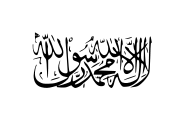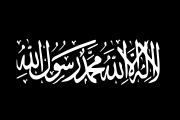- Divisions of the world in Islam
-
This article is part of the series: Islam 
The idea of geographical divisions along religious lines i.e. the dur is neither mentioned in the Qur'an nor in the sayings of the Prophet (called Hadith), which are considered the primary sources in Islamic jurisprudence. However, the idea was first suggested by the early Sunni Muslim jurist Imam Abu Hanifa, founder of the Hanafi school of Fiqh.
In Fiqh, the notion of dur (Arabic دور), usually translated as divisions of the world or "houses", is a conceptualization of the entire world as comprising either "Muslim territory" or "non-Muslim territory".[1][2] The singular form dar (دار), translated literally, may mean "house", 'structure", "place", "land" or "country".
Contents
Origins
The notions of "houses" or "divisions" of the world in Islam such as Dar al-Islam and Dar al-Harb does not appear in the Qur'an or the Hadith. This geo-political house of divisions was more acutely framed by another early Islamic scholar, Ibn Taymiyyah, who issued a treatise and a religious edict on the subject in response to the Mongol invasions of Muslim lands during the 13th and 14th centuries.[3]
Contemporary Islamic scholars have pointed out the inapplicability of this early philosophical division of the world given its lack of scriptural backing and its reflection of an early Muslim response to geo-political realities that simply do not exist today in a globalized world of international law.[3]
Major religious divisions
Dar al-Islam (House of Islam)
For other uses, see Dar es Salaam and Dar al-Islam (organisation).Dar al-Islam (Arabic: دار الإسلام literally house/abode of Islam; or Dar as-Salam, house/abode of Peace; or Dar al-Tawhid, house/abode of Union) is a term used by Muslim scholars to refer to those countries where Muslims can practice their religion freely. These are usually Islamic cultures wherein Muslims represent the majority of the population, and so the government promises them protection. Most Dar al-Islam areas are surrounded by other Islamic societies to ensure public protection.
Muslim scholars maintain and believe that the labeling of a country or place as being a part of Dar al-Islam revolves around the question of religious security. This means that if a Muslim practices Islam freely in his place of abode despite that the place happens to be secular or un-Islamic, then he will be considered as living in the Dar al-Islam.
Dar al-Islam is also known and referred to as Dar al-Salam, or house/abode of Peace. The term appears in the Koran in 10.25 an 6.127 as a name of Paradise.[4]
According to Abu Hanifa, considered to be the originator of the concept, the two requirements for a country to be part of Dar al-Islam are:[1][2]
- Muslims must be able to enjoy peace and security with and within this country.
- It has common frontiers with some Muslim countries.
If the former does not apply then physical means such as Jihad can be used to correct the situation and in the latter case, individuals are required to do hijra to where they can practice their religion.
Dar al-Harb (House of war)
Dar al-Harb (Arabic: دار الحرب "house of war"; also referred to as Dar al-Garb "house of the West" in later Ottoman sources; a person from "Dar al-Harb" is a "harbi" (Arabic:حربي)) is a term classically referring to those countries where the Muslim law is not in force, in the matter of worship and the protection of the faithful and Dhimmis. Territories that do have a treaty of nonaggression or peace with Muslims are called dar al-ahd or dar al-sulh.[5][dead link]
In Reliance of the Traveller, point w43.2, a hadith is referred to containing the exact word Dar al-Harb. Scholars have, nevertheless, disagreed on its reliability as is commented in Reliance of the Traveller.[citation needed]
Dar al-Amn (House of safety)
Dar al-Amn (Arabic: دار الأمن "house of safety") is a term proposed to describe the status of Muslims either in the West or other non-Muslim societies. The term dar al-Amn may be used in conjunction with, or in opposition to, the older terms dar al-Islam and dar al-Harb, from which it is derived. This region usually refers to countries where Muslims have the right to practice their religion. Many countries with Muslim minorities have been declared as Dar al-Amn at different points in time. For example, India has been declared as Dar al-Amn.[6]
Other ideological perceptions and international relations
Dar al-Hudna (House of calm)
Dar al Hudna (Arabic: دار الهدنة "house of calm"): The land of non-believers currently under a truce, which is a respite between wars. A truce is bought by tribute by harbis. If the harbis refuse to pay tribute in exchange for the truce, hostilities are resumed. Furthermore, only treaties that conform to Islamic prescriptions are valid; if these conditions are not fulfilled, the treaty is worthless.
Dar al-'Ahd (House of truce)
Dar al-'Ahd (Arabic: دار العهد "house of truce" or Dar al-Sulh "house of treaty") was invented to describe the Ottoman Empire's relationship with its Christian tributary states.
Today, the term refers to those non-Muslim governments which have armistice or peace agreements with Muslim governments. The actual status of the non-Muslim country in question may vary from acknowledged equality to tributary states.
Islamic flags, known as the Flag of Islam ('Alam al-Islam) or Flag of Shahada ('Alam al-Shahada) feature a script of the first Kalimah, the Shahada. White flags with black lettering represent 'Dar al-Salam/Islam' (such as the Taliban), and black flags with white lettering represent 'Dar al-Harb/Kufr' (such as the ICU).[citation needed] Dar al-Dawa (House of invitation)
Dar al-Dawa (Arabic: دار الدعوة "house of invitation") is a term used to describe a region where the religion of Islam has recently been introduced. Since the population had not been exposed to Islam before, they may not fit into the traditional definition of dar al-Harb. On the other hand, as the region is not yet Muslim, it cannot be dar al-Islam either. The most frequent use of the term dar al-Dawa is to describe Arabia before and during the life of Muhammad commonly referred as Jahiliyyah period, era of ignorance of divine guidance.
More recently, the term dar al-Dawa has been proposed by Western Muslim philosophers to describe the status of Muslims in the West.
The term dar al-Dawa may be used in conjunction with, or in opposition to, the older terms dar al-Islam and dar al-Harb, from which it is derived, or simply be seen as just another sub-category of dar al-harb.
See also
L Islamism:
I
References
- ^ a b Fatwa by Sheikh `Atiya Saqr, former head of Al-Azhar Fatwa Committee, about the concept of Dar al-Harb and Dar al-Islam
- ^ a b "Ahmed Khalil: "Dar Al-Islam And Dar Al-Harb: Its Definition and Significance"". English.islamway.com. http://english.islamway.com/bindex.php?section=article&id=211. Retrieved 2011-03-13.
- ^ a b The New York Times. http://www.nytimes.com/reuters/2010/03/31/world/international-us-islam-fatwa-violence.html?_r=13.
- ^ The Encyclopaedia of Islam. New Edition. Brill, Leiden. Vol. 2, p. 128
- ^ http://www.oxfordislamicstudies.com/article/opr/t125/e490?_hi=17&_pos=3
- ^ "India Is Darul Aman, Mr. Singhal | Indian Muslims". Indianmuslims.in. http://indianmuslims.in/india-darul-aman-singhal/. Retrieved 2011-03-13.
C
Additional reading
- Western Muslims and the Future of Islam, by Tariq Ramadan
- Fatwa on Terrorism and Suicide Bombings, by Muhammad Tahir-ul-Qadri
K
External links
Categories:- Islamic politics and Islamic world studies
- Pan-Islamism
- Islamism
- Islam and other religions
- Geography of religion
- Religious conversion
- Islamic concepts of religious geography
Wikimedia Foundation. 2010.


